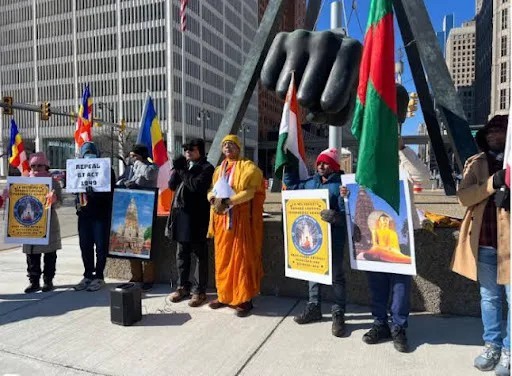Bodh Gaya Temple Act Sparks Ongoing Buddhist Protests
Why in the News ?
Since February 2025, Buddhist monks from the All India Buddhist Forum (AIBF) have been protesting against the Bodh Gaya Temple Act, 1949, demanding exclusive control over the Mahabodhi Mahavihara. The act mandates shared management by Buddhists and Hindus.
Background of the Controversy:
- Since February 2025, nearly 100 Buddhist monks under the All India Buddhist Forum (AIBF) have been protesting at Bodh Gaya’s Mahabodhi Mahavihara demanding the repeal of the Bodh Gaya Temple Act (BTA), 1949.
- The protest, supported by prominent Buddhist bodies, has escalated after a memorandum was submitted to the Bihar government.
- Bodh Gaya is one of Buddhism’s four sacred sites alongside Lumbini, Sarnath, and Kushinagar.
- Past protests include a 2023 rally in Gaya and Patna and a 2012 writ petition in the Supreme Court seeking to repeal the BTA, which remains pending.
Historical Significance and Ongoing Dispute:
- The Bodh Gaya Mahavihara was established by Emperor Ashoka in the 3rd century BCE and remained a Buddhist site until the 13th century when Bakhtiyar Khilji’s invasion led to its decline.
- A Hindu mutt was established in 1590 during Akbar’s reign, and the Bihar Assembly passed the BTA in 1949, creating a shared management structure.
- The Buddhist community demands exclusive control of the temple, citing its Buddhist heritage and religious significance.
- The ongoing protests highlight long-standing concerns over autonomy and management of the Mahavihara.
The Bodh Gaya Temple Act (BTA), 1949:● The BTA, 1949 established an eight-member management committee with an equal number of Buddhists and Hindus. ● The district magistrate serves as the ex-officio chairperson, historically leading to a Hindu majority on the committee, causing resentment among Buddhist bodies seeking autonomy over the Mahavihara. ● In 2013, the Bihar government amended the BTA, allowing chairpersons of any faith to hold the position. ● In the early 1990s, Lalu Prasad Yadav proposed the Bodh Gaya Mahavihara Bill to transfer control to Buddhist bodies, prohibiting idol immersions and Hindu marriages at the temple, but the Bill was never passed. |





